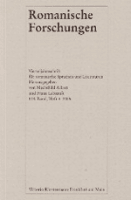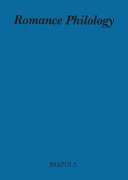
Etudes Romanes de Brno
metrics 2024
Bridging Theory and Practice in Language Studies
Introduction
Etudes Romanes de Brno, published by Masaryk University, Faculty of Arts, is a distinguished academic journal that has been contributing to the fields of Linguistics and Language as well as Literature and Literary Theory since its inception. With an ISSN of 1803-7399 and E-ISSN 2336-4416, this open-access journal has been a valuable resource for scholars since 2009, enhancing accessibility to a broad audience of researchers and students in the Czech Republic and beyond. The journal's impact is underscored by its categorization in the Q2 and Q3 quartiles for literature and linguistic studies as of 2023, reflecting its commitment to rigorous academic discourse. With Scopus rankings placing it in the 57th and 31st percentiles for its respective fields, it continues to attract high-quality submissions that explore contemporary issues in literary studies and language analysis. Etudes Romanes de Brno promises to remain an essential platform for the exchange of scholarly ideas, fostering growth and innovation in the humanities.
Metrics 2024
 0.13
0.13 -
- 0.10
0.10 3
3Metrics History
Rank 2024
Scopus
JCI (Web Of Science)
Quartile History
Similar Journals

Listy Filologicke
Connecting Disciplines: Where History Meets Linguistics and Literature.Listy Filologicke is a distinguished academic journal published by the Institute of Classical Studies at the Academy of Sciences of the Czech Republic, focusing on the interdisciplinary fields of History, Linguistics and Language, and Literature and Literary Theory. With an ISSN of 0024-4457 and an E-ISSN of 2570-9410, this journal has been a pivotal platform for scholarly discourse since its convergence years began in 2003. Notably, it holds a Q3 classification in History and Linguistics and Language, and a Q2 in Literature and Literary Theory as of 2023. Its rankings within Scopus illustrate its relevance and impact in academia, with noteworthy positions in the Arts and Humanities and Social Sciences categories. Researchers, professionals, and students will find Listy Filologicke an invaluable resource for exploring cutting-edge research, critical analyses, and discourse that contribute significantly to their respective fields. Based in the heart of the Czech Republic, it continues to promote scholarly excellence and foster international collaboration.

ROMANISCHE FORSCHUNGEN
Advancing Knowledge in Romance Language StudiesROMANISCHE FORSCHUNGEN, published by VITTORIO KLOSTERMANN GMBH, stands as a key scholarly journal in the fields of linguistics and literary studies, focusing particularly on Romance languages and literature. With an ISSN of 0035-8126 and an E-ISSN of 1864-0737, this journal is vital for researchers and scholars seeking to explore and advance their understanding of the nuances within Romance language studies. Operating from its base in Frankfurt am Main, Germany, ROMANISCHE FORSCHUNGEN features a robust publication history from 2002 to 2024. While currently categorized in Q4 within both Linguistics and Language and Literature and Literary Theory for 2023, the journal aims to cultivate a scholarly dialogue that bridges these disciplines, fostering an environment for innovative and critical inquiry. Although not an open-access journal, it serves as a crucial resource for professionals and students dedicated to Romance philology and comparative literature.

ROMANCE PHILOLOGY
Connecting Scholars through Passion for Language and LiteratureROMANCE PHILOLOGY is a distinguished academic journal dedicated to the exploration of language, literature, and linguistic theory within the Romance language family. Published by BREPOLS PUBL, it offers a platform for scholars, researchers, and practitioners to disseminate their findings and engage with the latest developments in these fields. The journal's impact factor reflects its standing, positioned within the Q4 category in Linguistics and Language and Q3 in Literature and Literary Theory for 2023, making it an essential resource for those studying Romance philology. Although coverage in Scopus was discontinued in 2021, the journal maintains a commitment to rigorous academic standards and comprehensive peer-review processes. With a broad scope encompassing theoretical and practical aspects of Romance languages and literatures, ROMANCE PHILOLOGY invites contributions that push the boundaries of knowledge and enrich the academic dialogue surrounding these vital areas of study. For those passionate about linguistic and literary pursuits, this journal stands as a significant gateway into the evolving discourse of Romance studies.

Moenia-Revista Lucense de Linguistica & Literatura
Fostering Innovative Research in Linguistic and Literary StudiesMoenia-Revista Lucense de Linguistica & Literatura, published by the esteemed Universidad de Santiago de Compostela, is a crucial academic journal dedicated to the fields of linguistics and literary studies. With its ISSN 1137-2346 and E-ISSN 2340-003X, this journal aims to advance scholarly discourse and provide a platform for innovative research in both linguistics and literature, with a particular focus on linguistic theories, literary analysis, and interdisciplinary approaches. The journal is categorized in the lower quartile (Q4) in its respective fields according to the latest metrics, including Scopus rankings, which place it within the challenges of the arts and humanities. Although currently not open access, it serves as an accessible resource for researchers and enthusiasts alike who are keen to explore diverse methodologies and theoretical frameworks. With its commitment to fostering rigorous academic inquiry, Moenia stands as a vital resource for those looking to deepen their understanding of the intricate relationships between language and literature.

Estudios Romanicos
Connecting Scholars with Cutting-Edge Research in the HumanitiesEstudios Romanicos, published by the Universidad de Murcia, is an esteemed open-access journal that has significantly contributed to the fields of Linguistics, Language, Literature, and Literary Theory since its inception in 1978. With an impact factor that elevates it to Q3 in Linguistics and Language and Q2 in Literature and Literary Theory as of 2023, this journal ranks impressively within its categories—placing it in the 76th percentile for Literature and Literary Theory, making it an essential resource for academic discourse. Based in Murcia, Spain, the journal embraces an open-access model, ensuring that its rich content is accessible to a global audience—fostering collaboration and cross-disciplinary research. The convergence of knowledge from diverse linguistic and literary perspectives allows researchers, professionals, and students alike to engage with cutting-edge scholarship and extend the boundaries of their own studies.

Studi Slavistici
Advancing Interdisciplinary Dialogue in Slavic StudiesStudi Slavistici is an esteemed academic journal published by FIRENZE UNIV PRESS, focusing on the rich and diverse fields of Cultural Studies, Linguistics and Language, and Literature and Literary Theory. Since its initiation in 2004, it operates under an Open Access model, providing unrestricted access to its contents and fostering a wider dissemination of research. Based in Italy, this journal serves as a vital platform for scholars and researchers engaged in Slavic studies and beyond, encouraging interdisciplinary dialogue and innovative approaches. With its current Quartile rankings in the Q4 category across various domains, it plays a significant role in shaping dialogues within the academic community while offering insights into contemporary and historical perspectives. By maintaining an inclusive vision and engaging with critical issues, Studi Slavistici remains dedicated to advancing knowledge and scholarship in these intricate fields.

Sibirskii Filologicheskii Zhurnal
Advancing the Frontiers of Linguistics and LiteratureSibirskii Filologicheskii Zhurnal is a prestigious academic journal published by the Russian Academy of Sciences, Institute of Cytology and Genetics. With ISSN 1813-7083, it is dedicated to advancing research in the fields of Cultural Studies, Linguistics and Language, and Literature and Literary Theory, and has achieved notable rankings, including Q2 in Cultural Studies and Linguistics, and Q1 in Literature for 2023. The journal provides a platform for scholarly discourse, contributing valuable insights to its fields with an evolving scope that spans from 2018 to 2024. Though not an open-access journal, Sibirskii Filologicheskii Zhurnal serves as a vital resource for researchers, professionals, and students in the Russian Federation and beyond, fostering a deeper understanding of linguistic and literary phenomena. Its commitment to high-quality content makes it an essential addition to any academic's library.

Revista de Estudios Latinos
Championing Quality Research in Latino StudiesRevista de Estudios Latinos is a leading academic journal published by SOC ESTUDIOS LATINOS, dedicated to advancing the field of Latino Studies. With an ISSN of 2255-5056, this journal serves as a vital platform for scholars, professionals, and students to explore diverse perspectives and research findings related to Latino culture, history, and social issues. Although it is currently hosted under a traditional subscription model, the journal is recognized for its commitment to quality, evidenced by its rigorous peer-review process. Situated in Madrid, Spain, the journal aims to bridge the gap between Latino communities and global academic discourse, fostering an interdisciplinary dialogue that enhances understanding and appreciation of Latino experiences. Researchers interested in contributing to this dynamic field will find a valuable outlet for their work within the pages of Revista de Estudios Latinos, solidifying its role as an essential resource in the study of Latin American and Latino affairs.

Lingue Antiche e Moderne
Illuminating Linguistic Pathways from Past to PresentLingue Antiche e Moderne is an esteemed open-access academic journal dedicated to the study of ancient and modern languages, published by UNIV STUDI UDINE. Since its inception in 2012, the journal has provided a platform for researchers, professionals, and students to disseminate groundbreaking studies and interdisciplinary research in linguistics and philology. With a commitment to accessibility, Lingue Antiche e Moderne encourages the sharing of knowledge across a global audience, ensuring that innovative ideas and historical insights are readily available to all. The journal plays a crucial role in advancing our understanding of linguistic evolution and cultural interchange, making it a vital resource for anyone interested in the dynamics of language through time. The ISSN for the journal is 2281-4841, ensuring its recognition in the academic community. Researchers and contributors are invited to engage with this vibrant discourse while enriching their own scholarly endeavors.

Revista Signos
Fostering Intellectual Dialogue in Linguistics and Literary TheoryRevista Signos, a prestigious publication by EDICIONES UNIV VALPARAISO, serves as a vital platform for scholars and practitioners in the fields of linguistics, language, literature, and literary theory. With an impact factor underscoring its academic excellence, the journal holds a commendable Q2 ranking in Linguistics and Language and a Q1 ranking in Literature and Literary Theory as of 2023. Its strong performance on Scopus, with ranks placing it in the 97th and 75th percentiles, respectively, illustrates its influential role in shaping contemporary discourse within these domains. Based in Chile, this journal not only disseminates critical research but also fosters intellectual dialogue, making it an essential resource for researchers, students, and professionals alike. Although it operates without open access, its commitment to quality and depth provides invaluable insights into the evolution of language and literature over its convergence years from 2007 to 2024. Engage with Revista Signos to explore the rich tapestry of linguistic and literary scholarship.